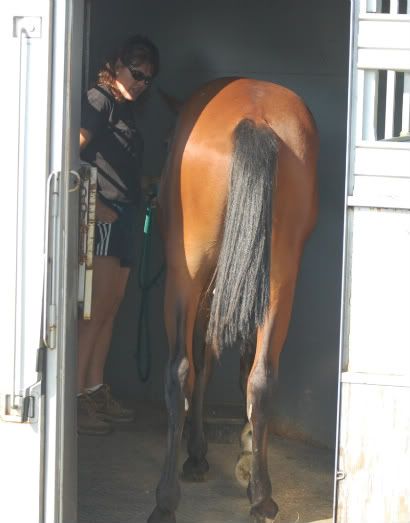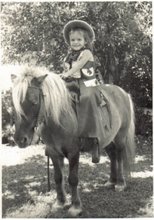I hope Darby's yearning intensity comes through in this photo. When I go to the barn at training time (the middle of the afternoon) he leans across the gate with the most earnest expression, saying, "Pick me! Pick me!"

This is the expression of a clicker-trained horse. I'm not dumb or naive; I know he wants the treats. But he knows we're going to play a game in which finding the correct answers to my questions is what gets him the treats. He knows there are treats and he knows there is a game that he always wins; it is a total win/win situation. And for me, in every session, I have an earnest student who is thinking and who is learning to understand what I want from him and who, without realizing it, is building up trust upon trust upon trust in every encounter because they all go well.
Well, almost all. The other day, Darby decided I was no longer allowed to pick up his right hind foot. Which, for the record, I have picked up nearly every day for the past five weeks with no problem. Not only would he not give me his foot, he also did an irritated little cow-kick when I tried. (This needs a post of its own called "Testing Boundaries" or "I Wonder What Happens When I Say No?") Not knowing what else to do, I unhooked the cross ties, put him in his stall, and took a couple of deep breaths while thinking how I should handle this situation. Then I remembered that Darby loves his training sessions. How better to "punish" him than to train someone else?
I got my beloved old Buckles out, put him in cross ties, and began grooming him. Buckles thought he'd died and gone to heaven and I was the Boss Angel in God's Heavenly Stable. I brushed and cooed and clicked loudly and often and made a huge show of giving treats and patting Buckles and telling him what a good boy he was. Now Buckles surely was surprised by this; it's no secret that Darby is the one in training and Buckles is maybe a bit neglected in the grooming department. However, my old guy rose to the occasion like it was his Broadway debut. He gobbled up the treats and the attention - at one point I think he purred - and was the perfect foil to help me bug Darby.
So, was Darby bugged? Well, at first he tugged on the cross tie he could reach from his stall (something he had never done before or since). This cross tie was one of two Buckles was tied to but Buckles and I ignored Darby. Seeing this had no effect, he began banging his water bucket (another thing I'd never seen him do; it was impressively noisy) and then he pawed for awhile. He was throwing a little tantrum; I smiled to myself.
I finished with Buckles, brought Darby back out and hooked him to the cross ties. He resisted my first attempt to pick up his right hind foot. I thought, "Okay, buddy. Last chance." Which must have taken just enough time for a light bulb to go on in his brain because the second try was easy, there was his foot and there were his ears going, "Oh, is this what you wanted?" in the most sweet and innocent way. I clicked, gave him a treat (or two), then finished up the session on a great note.
It is fair, though, and important, I think, to back up here and say, well, what if Darby had not been bugged by my working with Buckles instead of him? Certainly, this could have happened. One of the important things I've learned is to keep stopping and thinking.
If Darby had gone into his stall and started eating hay as if he were relieved to be off the hook, then I would have a lot of thinking to do. In any training situation, ten different trainers might come up with ten different solutions. So how do we know if the solution we have come up with is a good (or even great) solution? Here is what I think is the only criteria that makes sense: If the solution does nothing to destroy the trust, the confidence, and the enthusiasm that has been built up between the trainee and the trainer, it would be a good solution. Furthermore, I say, if the solution strengthens the trust, the confidence, and the enthusiasm between the trainee and trainer, that is a great solution.
I never want to lose that yearning intensity of my horse leaning over the gate, saying, "Pick me."









